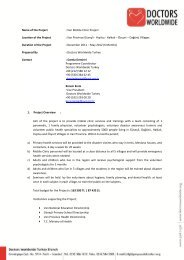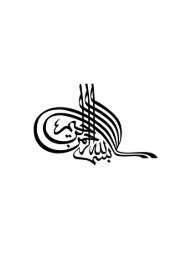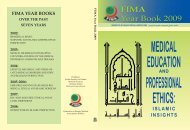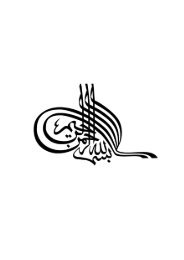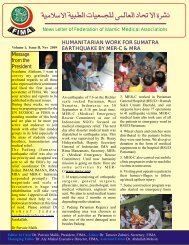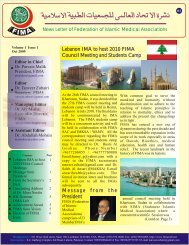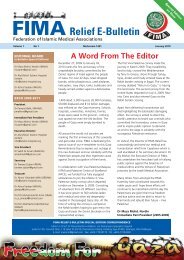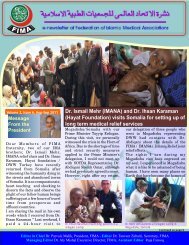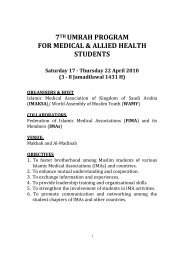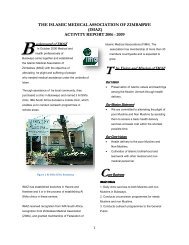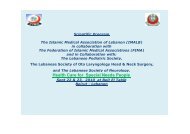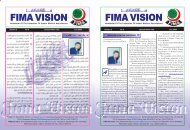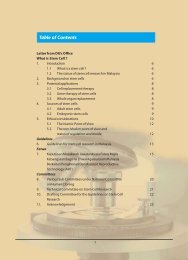FIMA Year Book 2010-2011 - Federation of Islamic Medical ...
FIMA Year Book 2010-2011 - Federation of Islamic Medical ...
FIMA Year Book 2010-2011 - Federation of Islamic Medical ...
You also want an ePaper? Increase the reach of your titles
YUMPU automatically turns print PDFs into web optimized ePapers that Google loves.
EDITORIAL<br />
isolation <strong>of</strong> affected women. The most common cause <strong>of</strong> these fistulae is neglected obstructed<br />
usually unattended deliveries. This is the result <strong>of</strong> lack <strong>of</strong> proper maternity services especially in<br />
remote / rural areas <strong>of</strong> the underdeveloped countries. In a sense, these fistulae are almost<br />
completely preventable with proper maternity care, and mostly correctable by surgery. However,<br />
the surgical repair involves delicate and skilled operative technique and needs to be performed by<br />
especially trained gynecologic surgeons. These conditions are almost non-existent in many <strong>of</strong> the<br />
poor developing countries. <strong>FIMA</strong> formed teams, the first <strong>of</strong> which arrived in Darfur, Sudan in 2008.<br />
So far, four camps carried out 167 surgical repairs in Sudan. Similar camps were arranged in<br />
Afghanistan and Pakistan with 89% success rate.<br />
Another equally important program is <strong>FIMA</strong> Save Smile (FSS) aimed at surgical repair <strong>of</strong> facial<br />
clefts. Dr Parvaiz Malik discusses this program. Cleft lip / palate is a relatively common congenital<br />
malformation with an incidence <strong>of</strong> 1/700 live births. FSS was formally adopted by <strong>FIMA</strong> executive<br />
Council on March 14,<strong>2010</strong> in its meeting in Makka, Saudi Arabia. A team <strong>of</strong> US physicians, members<br />
<strong>of</strong> the <strong>Islamic</strong> <strong>Medical</strong> Association <strong>of</strong> North America (IMANA) performed 62 repairs in Khartoum,<br />
Sudan with excellent results during March <strong>2010</strong>. Local plastic surgeons participated to get training<br />
in these procedures, and the surgical equipment was donated. The IMANA team returned to Sudan<br />
in March <strong>2011</strong> and 80 successful surgical repairs were performed. Another camp is planned to<br />
return to Khartoum this year. Meanwhile, DWW-Turkey team surgically corrected 125 cleft lip /<br />
palates in Palestine, Yemen, and Syria, in <strong>2010</strong>-<strong>2011</strong>.<br />
Drs Mohammad Khan, and Mohammed Tariq in another article describe the role that Pakistan IMA<br />
(PIMA) played in providing medical-humanitarian relief work in Pakistan since 2005. During this<br />
period Pakistan had been afflicted with several calamities; destructive earthquakes in 2005,<br />
massive internal displacements <strong>of</strong> people propelled by military operations <strong>of</strong> 2009-<strong>2010</strong>, and the<br />
huge floods <strong>of</strong> <strong>2010</strong>. They describe the contribution and collaboration <strong>of</strong> several other IMAs and<br />
NGOs in their relief efforts and how all these efforts were coordinated on the ground to result in<br />
a successful outcome. They provide guidelines for PIMA, <strong>FIMA</strong>, and other relief organizations to<br />
further strengthen the impact <strong>of</strong> the relief efforts. Some <strong>of</strong> these guidelines have already been<br />
incorporated by the National Disaster Management Coordination <strong>of</strong>fice.<br />
When we think <strong>of</strong> disaster medical relief, we do not usually think <strong>of</strong> medical education or regular<br />
training <strong>of</strong> physicians. But unfortunately this is important in Palestine. The grim situation <strong>of</strong> being<br />
under the harsh Israeli occupation, and especially the siege <strong>of</strong> Gaza caused serious damage to<br />
medical education. It created a significant need for outside help especially in training <strong>of</strong> the<br />
Palestinian physicians in the various medical specialties outside Palestine. This topic is discussed in<br />
an article by Dr Mishal. He describes <strong>FIMA</strong>’s efforts in this regard. This was accomplished in<br />
conjunction with various institutions and civil charitable organizations. Sponsored electives were<br />
<strong>of</strong>fered to Palestinian medical students mainly at the <strong>Islamic</strong> Hospital, Amman, Jordan. Residents<br />
from Palestine received specialty training mainly at medical institutions in Jordan. In addition <strong>FIMA</strong><br />
sponsored post graduate training <strong>of</strong> few residents in Egypt, Pakistan, and Malaysia. <strong>FIMA</strong> also<br />
helped in arranging for some pr<strong>of</strong>essionals to visit Gaza to support medical training there, but only<br />
for short periods. Telemedicine has been applied in collaboration with the Arab <strong>Medical</strong> Union <strong>of</strong><br />
Egypt and the Jordanian Committee for Supporting the Health Sector in Gaza.<br />
One <strong>of</strong> the worst examples <strong>of</strong> man-made disasters is the situation in Gaza / Palestine. Gazans have<br />
been under the harsh Israeli occupation from 1967 to 2005 and the later imposition <strong>of</strong> siege in<br />
2006.The situation became significantly worse with the military assault in December 2008 and the<br />
<strong>FIMA</strong> <strong>Year</strong><strong>Book</strong> <strong>2010</strong>-<strong>2011</strong><br />
XI




